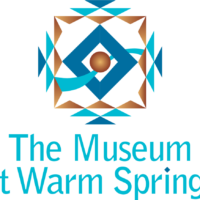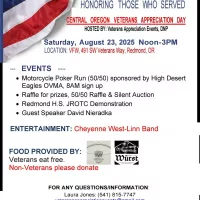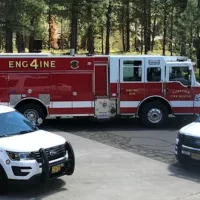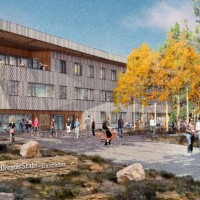
The Museum at Warm Springs, which is celebrating its 30th Anniversary throughout 2023, hosted a Gala Celebration and Fundraiser on Friday evening, October 13. Nearly 160 guests attended the event, which was held at Tetherow in Bend, Oregon. It was the first fundraiser that The Museum had hosted since 2019 due to the Covid-19 pandemic, which curtailed larger gatherings during 2020-2022.
The event netted $110,000 through event partnerships, individual ticket sales, generous individual donations, and additional grants and gifts. The monies raised will enable The Museum at Warm Springs to continue its 30-year tradition of sharing the history, culture and art of The Confederated Tribes of Warm Springs and other Indigenous peoples, to pass along traditional Tribal artistic and cultural knowledge, including language, through its community classes, and help preserve and protect The Museum’s precious objects, historic photographs and archival materials.
The event’s major partners were Indian Head Casino & Plateau Travel Plaza — Warm Springs Gaming Enterprise and The Gordon Family. Other event partners included: The Confederated Tribes of Warm Springs Tribal Council; Confederated Tribes of Siletz Indians Tribal Council; The Roundhouse Foundation; BBK Best, Best & Krieger LLP; Warm Springs Power and Water Enterprises; Visit Central Oregon; Travel Oregon; Portland General Electric Foundation; Empire Construction & Development; City of Bend; Central Oregon LandWatch; Elizabeth Woody and Dwight Ball Morrill; Orrick; Desert Botanicals; Pahlisch Family Foundation; BNY Mellon Pershing (John and Brenda Curnutt); St. Charles Health Systems; Brooks Resources Corporation; and Sunriver Resort.
“On behalf of The Museum of Warm Springs, Boards of Directors, Board of Regents, and our staff, I want to thank everyone who attended and so generously contributed to making our event such a success,” said Museum Executive Director Elizabeth A. Woody (Warm Springs, Yakama and Diné). “We are greatly appreciative of the grants and gifts that we receive from our many partners throughout the year — we depend on them to be able to offer the type of programming that will benefit the Warm Springs people and all others who visit our Museum.”
“However, our work at The Museum is far from over, and we are now looking forward to the next 30 years and beyond as we continue to build on this year’s anniversary theme of ‘renewal,’ which means refreshing The Museum’s aging infrastructure, replacing the HVAC system, and refurbishing our popular Permanent Exhibit,” said Woody. “And for that to happen, we will continue to look to the continued support from our partners.”
Renowned linguist and scholar Dr. Phillip Cash Cash (Nez Perce/Cayuse) was the evening’s emcee. Cash Cash is also an accomplished musician of the Native flute and presented original music during the evening.
Roberta “Bobbie” Conner (Cayuse, Umatilla and Nez Perce; citizen of the Confederated Tribes of Umatilla) and W. Richard West, Jr. (Cheyenne and Arapaho Tribes; member of the Society of Southern Cheyenne Peace Chiefs) received The Museum’s Twanat Award. The Award honors individuals whose efforts on behalf of Native Americans serve as an example for all Americans. Both were honored for their lifelong work in promoting the history, arts, culture, language and lifeways of the Native peoples of the Western Hemisphere as well as their support of the importance of tribal museums, programs and initiatives throughout the United States.
“These years at the Museum the word Twanat above the door has been interpreted to me as ‘to follow,’” said Woody. “It has come to my understanding that in order to follow we had instruction to do so from our ancestors and the One Who Made Us. These are teachings and precepts on the best way to live and care for our little relatives, the traditional foods and the life around us on the precious land. It also means we need guidance and our leadership is brought up at a young age to watch and learn from our leaders.”
“Leaders like Roberta Conner and Rick West… they are descendants of great leaders, like Chief Joseph’s brother Ollikut and Society of Southern Cheyenne Peace Chiefs,” said Woody. “They are the leaders who work for the future leaders that are to come. That is what these two leaders embody. They follow the ancestors and work for our community today and the future.”
Conner has been the director of Tamástslikt Cultural Institute, the 45,000 square foot museum on the Umatilla Reservation near Pendleton, Oregon, since its opening in 1998. The Institute serves three goals: provide accurate representations of Cayuse, Umatilla, and Walla Walla cultures and histories; perpetuate tribal knowledges; and contribute to the Tribal economy. It is the only tribally owned interpretive center on the Oregon National Historic Trail and one of a handful on the Lewis and Clark National Historic Trail. Conner currently serves on the Oregon Historical Society Board of Trustees and Ecotrust, Oregon Community Foundation, and Nixyáawii Community Financial Services Boards of Directors. She is a former chair of the Smithsonian’s National Museum of the American Indian Board of Directors.
Richard West, Jr. is founding director and director emeritus of the Smithsonian Institution’s National Museum of the American Indian and president and CEO emeritus, ambassador, Native Communities, of the Autry Museum of the American West in Los Angeles, California. West served as chair of the Board of Directors of the American Alliance of Museums (1998-2000) and vice president of the International Council of Museums (2007-2010). His current board affiliations include The Association of Tribal Archives, Libraries and Museums; Cheyenne and Arapaho Business Development Corporation; International Coalition of Sites of Conscience; Denver Art Museum; The MICA Group; and UCLA Institute of Environment and Sustainability. West previously served on the boards of the Ford Foundation, Stanford University, and the Kaiser Family Foundation. He has been awarded 10 honorary doctorate degrees.
“Tribal museums do not exist to encase objects of dead cultures,” said Conner. “Tribal museums are not red washing the history others have told. Instead, tribal museums are giving voice and venue to living cultures and histories that have not been told or have been omitted, erased, sanitized and altered by ‘the victor.’ Museums and libraries are institutions of public trust and tribal museums are just that. Individual tribal cultural identities are formed in the longhouse, the sweathouse, the hunting grounds, the fishing sites, the digging and gathering places. The tribal museum functions as an intermediary between the visitors and community that wants to learn about the culture and history and the people who live the culture and continue to make the history.”
“Built to the demanding and high standards of the Smithsonian Institution, with Museum’s uniquely powerful and telling architecture, exhibitions, and public programming, The Museum at Warm Springs has always been at the forefront of what tribal museums and cultural institutions can be and the broader public impact they can have,” said West. “You and I need to be sure that this gemstone of a tribal museum is protected, for the sake of all of us, for the future. The Museum at Warm Springs, of course, has tremendous relevance and import to the Warm Springs, Wasco, and Northern Paiute peoples. It affirms and honors their cultural perseverance and historical tenacity from a deep past through the present and into the future.”
George W. Aguilar, Sr. (Wasco) was honored with The Museum’s Lifetime Achievement Award. Aguilar is an elder and life-long resident of the Warm Springs Reservation who won the 2006 Oregon Book Award for Creative Nonfiction for his book, “When the River Ran Wild! Indian Traditions on the Mid-Columbia and the Warm Springs Reservation.” The book, which also received the 2006 Award of Merit from the American Association for State and Local History, has been widely praised for its well-researched and clear-headed blending of tribal traditions and customs, written history, and personal recollections. It is the first book on the heritage of the Warm Springs people to be written by a tribal member. Aguilar raised his family in Warm Springs, is a Korean War veteran and has worked as a laborer, fisherman, logger and construction manager.
About The Museum at Warm Springs
The Museum at Warm Springs opened its doors to the public on March 14, 1993 and is celebrating its 30thanniversary throughout 2023 with special exhibits, public programs and events. Built to Smithsonian Institution professional standards, The Museum’s mission is to preserve, advance and share the traditions, cultural and artistic heritage of The Confederated Tribes of Warm Springs, Oregon. Regular Museum hours are Tuesday through Saturday, 9 a.m. to noon and 1 to 5 p.m. The Museum is closed on Thanksgiving, Christmas and New Year’s Day. Admission: Museum Members (free), Adults ($7), Senior Citizens over 60 ($6), Students 13-18 with student body card ($4.50), Children 5-12 ($3.50) and Children 4 and younger (free). The Museum is located at 2189 Highway 26 in Warm Springs. Phone: (541) 553-3331. For more information, visit https://www.museumatwarmsprings.org/.
Become a Museum Member
The Museum will begin its annual Membership Drive in late 2023. There are several levels of annual Museum Membership, which begin at $25 for elders and students. All Members receive these benefits: free admission for one year, 10% discount in the Museum Gift Shop and special invitations to exhibits and programs. Join by visiting https://museumatwarmsprings.org/ and click “Join” to see Membership levels and online payment information. Or send a check to: The Museum at Warm Springs, P.O. Box 909, Warm Springs, OR 97761 (Attn: Membership).















